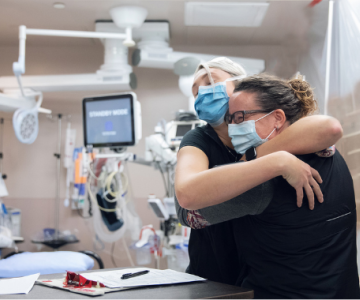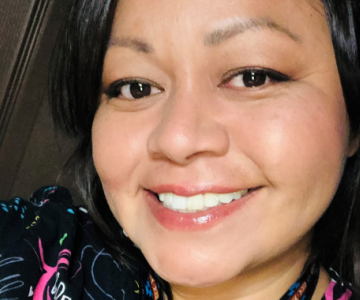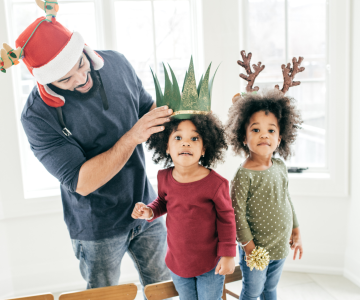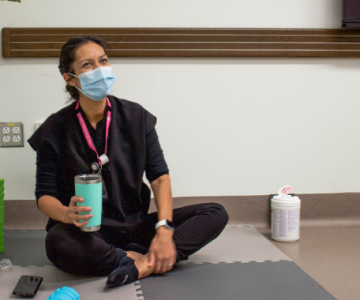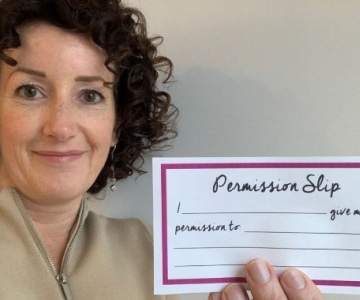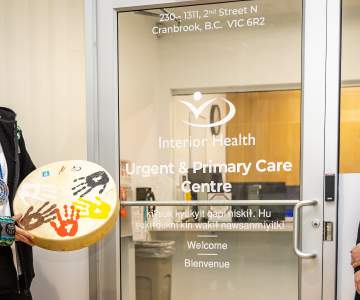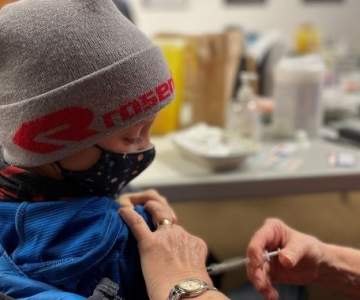Breadcrumb
Explore Stories
Health & Wellness
Podcasts about mental wellness are a great way to relax, learn something new, and find inspiration, all in a convenient and entertaining package. They are especially helpful during the dark cold days of winter when we can all use a lift.
There are also an increasing number of wellness-focused Apps available.
But the sheer number of these podcasts and Apps can make choosing overwhelming. There are thousands. Where to start?
We asked our Mental Health and Substance Use team for some recommendations. Here are their Staff Picks:
Podcasts:
Unlocking Us: Researcher, speaker and best-selling author Brené Brown discusses the “universal experiences of being human, from the bravest moments to the most broken-hearted.”
10% Happier: Journalist Dan Harris delves into meditation, anxiety, relationships and productivity.
Feel Better. Live More: Dr. Rangan Chatterjee aims to simplify health and provides tools and tips to live a more balanced and health-focused life.
Sickboy: Sickboy co-hosts interview guests who share firsthand stories, often speaking openly and frankly about death, disease, disability, and other topics that deserve to be highlighted instead of hidden in the shadows.
Conan O’Brien Needs a Friend: Famous late-night host Conan O’Brien is hilarious. But he is also lonely. Listen in as he delves into intimate conversations and makes real connections.
Reminder, if you have sensitive ears or children nearby, pay attention if there is an “E” beside the podcast episode listing - it means explicit language.
Wellness Apps:
Headspace: Headspace provides meditation and mindfulness tools to help develop habits that support positive mental health.
Tide: With options around improved sleep and focus, as well as guided meditation and breathing, Tide is “a massage for your brain” using nature sounds and other techniques.
Calm: This App offers meditations, visualizations, guided breathing and sleep stories, designed to help you relax and rest.
Don’t forget we have our own podcast. Check out Interior Voices, which explores Aboriginal health and culture.
Happy listening!
*Download and/or subscription fees may apply.
Health & Wellness
Are you preparing to take your child for their COVID-19 vaccine? We asked one of our experts, nurse Barb Paton, for tips on what to expect.
Check out her videos or read her tips below on what to expect before, during, and after the appointment.
Before Your Child’s Appointment
Plan to be at our clinic for about half an hour to an hour and it’s a good idea to give them a snack beforehand. Remember to bring your child’s Care Card and booking confirmation and be sure they are wearing a mask and a short-sleeved shirt so that we can easily give them their vaccine.
During Your Child’s Appointment
All our public health nurses at immunization clinics are trained to work with children and can help you work with your child to support them. When we meet you and your child, we’ll talk to you about the vaccine and answer any questions you may have. There’s no rush!
Feel free to use puzzles, games or other distractions to help your child if they are feeling a little nervous. Doing breathing exercises can help reduce any stress, as well. Again, our job as your child’s care provider is to make the experience as positive as possible.
The paediatric vaccine is a smaller dose than what is given to older children and adults, and takes only a moment to administer. Sometimes children’s imaginations make it scarier than it actually is, and kids usually say it didn’t hurt as much as they thought.
After Your Child’s Appointment
After the vaccination, you and your child will wait in the recovery area for 15 minutes. Then you’re all done! Congratulations – you’re child is a vaccine champion!
There are some common side effects such as pain, and redness at the injection site. These will pass quickly.
Headache, muscle aches and fever or chills are quite less common compared to adolescents who received the adult vaccine. Serious side effects are very rare, but if you notice any health or behaviour changes contact 811 or your healthcare provider.
Looking for more information?
Check out our information on COVID-19 vaccines for children 5-11.
About the author
Barb Paton is a public health nurse who has been practicing for 25 years.
Community & Culture
"This year, communities across the Interior region faced many difficult challenges. And still, the spirit of compassion and partnership that is shared across our region pulled us through.
I am incredibly proud of everyone at Interior Health and for the work we do together with partners. You have made a difference in the lives of patients and families for years to come.
May you enjoy a wonderful holiday season, and may the new year bring health and well-being to you and your loved ones."
Susan Brown
President & CEO
Community & Culture
We are IH is a recognition campaign to spotlight Interior Health employees and medical staff – through pictures and stories.
Name: Candace Baptiste
Job Title: Nursing Assistant
Years of Service: 12 years
Worksite: Sunnybank Centre
Community: Oliver
Ancestral Territory: Syilx
Advice to live by: Everyone should treat people the way they would like to be treated.
For Candace Baptiste, working as a nursing assistant at Sunnybank Centre in Oliver is a labour of love. She began working in long-term care 12 years ago because of her grandparents – she grew up close to them and wished she could provide more help as they aged.
“I still til this day treat the people I care for as grandmas and grandpas,” she says.
Candace supporting Orange Shirt Day.
As a Syilx woman from the Osoyoos Indian Band, Candace was raised to respect her elders. She is proud of her heritage and takes pride in her work, too.
“Everyone should treat people the way they would like to be treated,” she says. “I also believe in working as a team and helping everyone on the floor.”
Candace would like to see more recognition of Indigenous culture within Interior Health. Through her chosen career, she has been able to care for members of her community and serve as a liaison for the Osoyoos Indian Band.
“I believe in empowering individuals who may not have a voice of their own.”
In her free time, Candace loves to cook and spend time with her family. The family favourite is Indian tacos. Candace makes them with a big batch of ground moose or deer meat and bannock prepared the way her grandma taught her.
“It’s pretty close to hers, but not exactly the same yet,” she says. “I have been making it for at least 20 years now and I hope I can get it like my grandma's one day.”
Candace’s nomination keeps the We Are IH loop going:
Candace nominated her colleagues from Sunnybank – Kelsey Medria and Amy McPherson to highlight in a future We Are IH.
Stay updated with careers at Interior Health
Facebook: Interior Health | Instagram: interiorhealthbc
| LinkedIn: Interior Health Authority
Health & Wellness
The holiday season is a wonderful time of the year to gather with family and friends. Let’s do so safely and protect ourselves and others, especially people who are more vulnerable.
We have created a quiz to help you test your knowledge on how you can stay safe.
Take the COVID-19 holiday safety quiz
Health & Wellness
Whether it's stretching, reading, or just relaxing, wobble rooms like this one at Kelowna General Hospital are becoming a refuge for health-care workers in Interior Health.
As the COVID-19 pandemic and toxic drug crisis continue to challenge health-care workers in their day-to-day work, the question continues to arise about how people can protect their psychological safety while dealing with the demands they face in the workplace.
A new concept called wobble rooms is helping employees and medical staff de-stress and connect with one another in a quiet environment. Inspired by similar rooms at Vancouver General Hospital, Interior Health now has wobble rooms at Kelowna General Hospital (KGH) and, newly opened, Royal Inland Hospital (RIH) in Kamloops, making use of meetings rooms that have been primarily empty during the pandemic. Also in Kelowna, Brookhaven Care Centre is in the process of converting an education space to a wobble room, with an expected opening in mid-December.
According to an article in Nursing Leadership, “the ‘wobble room’ is a wellness intervention designed to guide staff through unpredictable times that are not going away quickly… The wobble room has become a place where staff can make sense of how the pandemic is affecting them and create a ‘new normal’ with respect to personal safety and team cohesion.”
“We already provide cultural spaces for patients. We wanted to also dedicate space to staff to unwind and de-stress,” says Derek Koch, Spiritual Health Practitioner at KGH.
Wobble rooms provide space for health-care workers to sleep, breathe or sit. Yoga mats allow for stretching. At KGH, there’s a computer for personal use, a colouring station, puzzles, books for reading and an energy candle – in other words, something for everyone.
Derek says when he walks by and peeks in the window, there’s usually someone in there making use of the space.
In Kamloops, RIH’s wobble room opened at the beginning of December. With comfortable places to sit, a colouring table and a wall of inspirational images and messages, this space is already proving to be popular with staff.
"I would like to thank the task team who was able to capture the essence of what the room represents, and the RIH Foundation for making this needed space a reality," says Tracey Rannie, Executive Director, Clinical Operations, at RIH.
The puzzle station and reading nook are popular spots in Kelowna General Hospital's wobble room.
Taking a break in a lounger in Royal Inland Hospital's wobble room.
Health & Wellness
In Pause for Wellness, people in the Interior Health community share their personal stories, journeys, and insights about health and well-being.
With the help of some amazing mental health professionals and a lot of reading, I’ve been learning about who I am and understanding my "authentic self".
Lately, I’ve been thinking more about why I don't always live and behave like that person. And I've started to understand that permission has been getting in my way.
I have three young kids at home and the topic of permission comes up a lot. Whether it's permission to stay up late, to go on a field trip or have a second cookie, my kids look to me for permission to do things pretty regularly.
So I'm wondering, if I'm the parent, who do I look to for permission to be my authentic self?
It turns out the answer is pretty simple and you don't have to go far to get it. You don’t need anyone’s permission but your own.
Whether it’s permission to walk away, permission to try something else, or permission to try again; you have it. You only need to decide to give it to yourself.
About the author
Hi! My name is Megan and I'm part of the communications team at Interior Health. I live in Kelowna, on the beautiful lands of the Syilx peoples. The Interior Health value that means the most to me is compassion. I think compassion starts at home, with our families and ourselves. And I love being part of an organization where we're encouraged to bring compassion to work each day and to use it to make a difference in the lives of the people we meet.
Community & Culture
Ktunaxa Nation cultural educator Jared Basil presents a drum to Interior Health’s Shannon Statham, at a Ktunaxa Nation drum ceremony at the newly opened Cranbrook urgent and primary care centre. A welcome to the building in Ktunaxa language is on the front door, the exterior sign, and other places in the facility.
For as long as he can remember, Jared Basil has loved to dance.
Every May long weekend, dressed in full regalia, he dances to the drums of the Lower Kootenay Band at its annual Yaqan Nukiy Pow Wow.
In elementary school he remembers being jeered by classmates as he danced during presentations. But dancing keeps him grounded; connected to his culture and to the Ktunaxa Nation.
“Dancing has always been in my life. It’s something I have always been able to showcase without fear of animosity. When the drum is going...the drumming is meant to represent the heartbeat of Mother Earth, so when you are connected and grounded to that, sometimes it feels like nothing else matters.”
Dancing is also part of what helped bring Jared back from hardship. As a young adult, Jared fell into substance use but has been turning his life around since 2010, the same year he worked a stint at the 2010 Olympics in Vancouver.
A return to his roots and culture, a return to dancing, and the arrival of his son, all helped to bring him back to his community and to health.
“I came back for a pow wow and I had been gone so long…I didn’t have regalia…it was like I had forgotten how to dance,” he says. “But I was at this pow wow and I was just feeling this need and wanting to dance. So, I started dancing again. Being a part of that was so meaningful. Having that ability to dance again was one of the most important aspects of being able to get back into my culture. It reinvigorated me. And having a son was a big factor in relearning the culture.”
Months after that pow wow, Jared and his girlfriend (now fiancé) returned to Creston and Jared threw himself into the community. He was elected to band council for six years before joining the Ktunaxa Nation in his current role as a cultural educator, working with the traditional language and cultures of the Ktunaxa.
It’s a role that brought him together with the team working to open the new urgent and primary care centre (UPCC) in Cranbrook, on the traditional territory of the Ktunaxa. Jared joined the team in the planning stages and connected with language experts and elders in the Nation to provide words and phrases to be used at the centre.
Traditional language has become part of Interior Health capital projects with projects featuring language pieces designed to make buildings welcoming spaces for people of all cultures and backgrounds.
On the Cranbrook UPCC sign, the phrase Ya·kiⱡ ʔawumuʔtiⱡamnamki roughly translates to ‘a place to seek medical help.’
“We have always wanted to preserve and advance our language but non-Indigenous communities haven’t always wanted to create space for that kind of opportunity,” he says. “Now we are in a different era. We live in a time of truth and reconciliation. It’s about embracing each other’s cultures…that ability to be open to all.”
Other phrases will be on the entrance door to the UPCC and inside on different rooms.
“The advancement of the language in a respectful manner is so important. For our future generations to start seeing their language on buildings like this speaks to a different level of esteem that some of us Indigenous people never had in the past.”
The Cranbrook UPCC opened on Dec. 6 in the Baker Street Professional Centre. It features a team-based care environment with physicians, nurse practitioners, physicians, physiotherapists and more treating people who need urgent care within 12 to 24 hours.
The Numa Kakin’ drum group performs at a Ktunaxa Nation drum ceremony at the Cranbrook urgent and primary care centre on Dec. 10.
Welcoming Words
Ktunaxa Nation cultural educator Jared Basil worked with language experts and elders in the Nation to provide words and phrases to be used at the new Cranbrook urgent and primary care centre. Here's an example of some the phrases you'll see there, and loose translations of what they mean:
Front door sign: “Kiʔsuʔk kyukyit q̓api niskiⱡ. Hu sukiⱡq̓ukni kin wakiⱡ nawsanmiyitki"
Good day everyone. I am glad/pleased that you arrived.
Exterior building sign: “Ya·kiⱡ ʔawumuʔtiⱡamnamki”
Where/There is/Place where” to seek medical help.
Group room sign: “Ya·kiⱡ ȼxanaʔt”
Where/There is/Place where” to tell someone/ to relate or to explain to someone.
Consultation room sign: “Ya·kiⱡ hakq̓ti·mu”
Where/There is/Place where” to discuss something/ to have a meeting or discussion over a particular issue.
Health & Wellness
Last week, Interior Health began offering the paediatric COVID-19 vaccines to children age five to 11 in communities across the region. The response from families and communities has been positive and thousands of children in this age group have already booked appointments across B.C.
Many families have expressed how relieved and grateful they are to have their younger children vaccinated against COVID-19. There are also others who have questions, understandably, and it is important we continue to make it easy for parents and guardians to have access to the factual information they need to make the decision to get everyone in their family vaccinated.
The paediatric Pfizer vaccine is available for five to 11 year olds in B.C. It is a smaller dose of the same vaccine administered to millions people globally over the past year.
There were no severe reactions in children during clinical trials and any mild side effects (sore arm, fever) subsided in a day or two. In our clinics across IH, specially trained pediatric immunizers and public health nurses are on hand to provide care and support children receiving the vaccine.
Like youth and adults, we know children need protection from COVID-19. Since Sept. 1, children aged five to 11 have accounted for 16 per cent, or close to 2,000 of COVID-19 cases in the Interior region, the highest rate of infection of all age groups.
While most of these children experience mild to moderate illness from the COVID-19 virus, some children can get severely ill requiring hospital admission while others can have lingering symptoms or health issues long after their infection. Vaccination will help reduce this risk and these impacts.
Data from studies of children aged five to 11 has shown that the vaccine is 91 per cent effective against preventing COVID-19 infections, and even better for preventing severe illness and hospitalization. This level of immunity is remarkable. Still, we know that the body takes time to build its immune response and that full immunity is achieved about seven days after the second dose.
I know some families are tempted to “wait and see,” and to put off the decision to vaccinate children for a few months. However, as we head into the holiday season and winter gatherings, vaccination offers the best protection – now and in the first months of the New Year.
When children are immunized, not only are they better equipped to fight off infection, but they’re less likely to need to miss school or social activities that are important to their well-being. They’re also less likely to spread the virus to others, including grandparents, aunts and uncles, neighbours or people with compromised immune systems. Don’t delay the benefits by waiting longer than necessary.
Now is the time to consider the reasons that are important to your family and to register your children to be vaccinated at gov.bc.ca/vaccineforkids and if you have any questions or concerns, please speak with your family’s care provider, call 8-1-1 or learn about COVID-19 vaccines for children 5-11 at interiorhealth.ca.
About the author
Dr. Sue Pollock is Interior Health's interim chief medical health officer.
-
Load More
Showing 531 of 787
Sign up for email updates
Receive news, alerts, public service announcements and articles right to your inbox.




